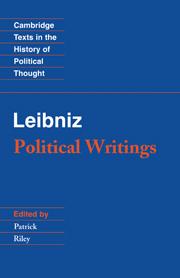Book contents
- Frontmatter
- Contents
- Preface to the Second Edition
- Abbreviations
- Introduction
- Part I On Justice and Natural Law
- Part II On Social Life, Enlightenment and the Rule of Princes
- Part III On State-Sovereignty and Hobbesian Ideas
- 8 Caesarinus Fürstenerius (De Suprematu Principum Germaniae) (1677)
- Part IV On the Defense of Hapsburg Europe against France
- Part V On International Relations and International Law
- Part VI Political Letters
- Part VII Sovereignty and Divinity: Unpublished Manuscripts, 1695–1714
- Critical Bibliography
- Index
8 - Caesarinus Fürstenerius (De Suprematu Principum Germaniae) (1677)
Published online by Cambridge University Press: 05 June 2012
- Frontmatter
- Contents
- Preface to the Second Edition
- Abbreviations
- Introduction
- Part I On Justice and Natural Law
- Part II On Social Life, Enlightenment and the Rule of Princes
- Part III On State-Sovereignty and Hobbesian Ideas
- 8 Caesarinus Fürstenerius (De Suprematu Principum Germaniae) (1677)
- Part IV On the Defense of Hapsburg Europe against France
- Part V On International Relations and International Law
- Part VI Political Letters
- Part VII Sovereignty and Divinity: Unpublished Manuscripts, 1695–1714
- Critical Bibliography
- Index
Summary
Leibniz' main purpose in writing this extremely long work, of which only a few excerpts are reproduced here, was the redefinition of the concept of sovereignty in a way which would allow the minor German princes to be treated as sovereigns in international negotiations. In his effort to weaken the idea of sovereignty, and to make it consistent with, e.g., the allegiance which a ‘sovereign’ might owe to a ‘universal’ power such as the Holy Roman Empire or (perhaps) the Papacy, Leibniz mounted an interesting attack on Hobbes – this passage is translated in full – and defended at length the value of the medieval ‘Republic of Christendom’. In the Caesarinus Fürstenerius he was attempting to maintain a delicate balance between medieval and more modern ideas. (The original Latin text is to be found in the Academy, Dutens, and Klopp editions of Leibniz' works.)
PREFACE TO THE READER (EXCERPT)
The position of the [Holy Roman] Emperor is a little more elevated than one commonly thinks; Caesar is the defender, or rather the chief, or if one prefers the secular arm of the universal Church. All Christendom forms a species of republic, in which Caesar has some authority – from which comes the name, Holy Empire, which should somehow extend as far as the Catholic Church.
- Type
- Chapter
- Information
- Leibniz: Political Writings , pp. 111 - 120Publisher: Cambridge University PressPrint publication year: 1988
- 1
- Cited by



